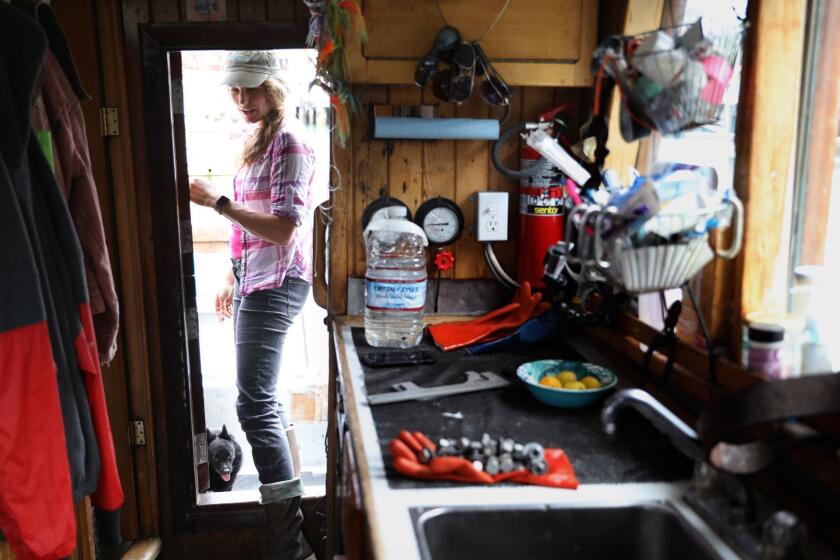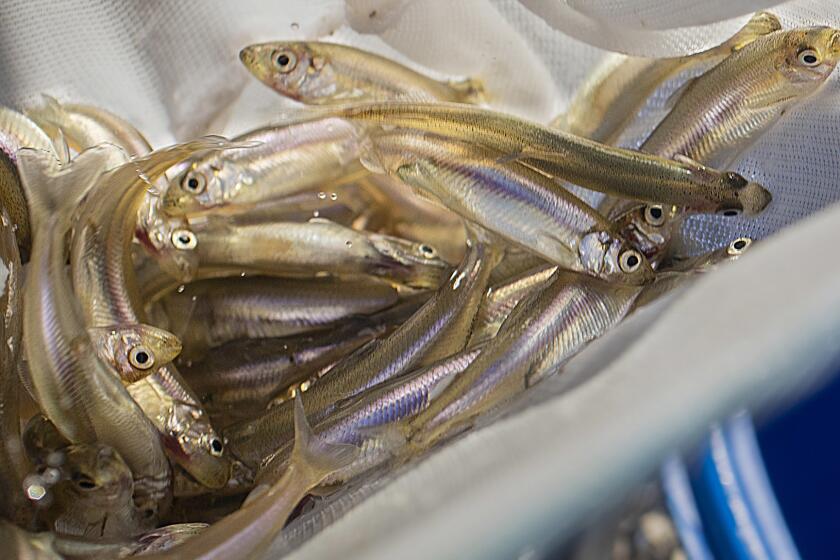Column: With attacks on the lowly delta smelt, Trump and the GOP launch baseless claims about fire and water

- Share via
Pity the poor delta smelt.
The tiny fish, which seldom grows to more than four inches or lives longer than a year, was once abundant in the Sacramento-San Joaquin Delta. It was an important link in the delta food chain, and valued as a food fish by local residents at least through the 1920s.
By the mid-1980s, however, the delta smelt was on the road to extinction, the victim of numerous changes in its habitat. Water diversions from the delta to farms in Northern California and residential users in the south depleted water flows.
One of the most reviled fish in the West
— Ecologist Peter Moyle on the delta smelt
The huge state and federal pumps in the delta sucked in the fish, further threatening the species’ survival. Invasive species such as the overbite clam consumed the zooplankton on which juvenile smelt had fed, toxic chemicals in farm runoff fouled the waters.
Now the delta smelt is functionally extinct in the wild, the species preserved only through a state and federal hatchery program, the success of which is uncertain. California environmental authorities have detected no wild smelt in the delta since 2017.
Get the latest from Michael Hiltzik
Commentary on economics and more from a Pulitzer Prize winner.
You may occasionally receive promotional content from the Los Angeles Times.
None of that has immunized the lowly smelt from its most obdurate enemy: partisan folly.
The Southern California wildfires have generated billows of noxious smoke coming from Donald Trump and his GOP sycophants, who claim that efforts to protect the smelt from extinction have complicated firefighting efforts by diverting water that could have been used to extinguish the blazes.
In a Truth Social post, Trump accused Gov. Gavin Newsom (whom he addressed with an infantile insult) of wanting to “protect an essentially worthless fish called a smelt.”
Bizarrely, Trump stated that Newsom wanted to protect the smelt by “giving it less water;” possibly he meant “more water,” since increasing water flows would be the instrument of environmental protection for the delta smelt, but who knows?
The right-wing campaign to demonize the tiny delta smelt so Big Ag can get more water continues, ignorantly
“The delta smelt is standing in the way of getting desperately needed water to a number of parts of California,” Sen. Mike Lee (R-Utah) pontificated on television last week. “The fact that California’s own leadership is steadfast in protecting the delta smelt above everything else shows just how ridiculous their priorities are.”
The delta smelt has been called a “sentinel species,” meaning that its health signals the condition of its ecosystem — and the signal it has flashed is alarming. (Think of it as a canary in the environmental coal mine.)
It’s also a signal of another kind: Claims that the fish has anything to do with the fires indicates a speaker’s surpassing ignorance about water, the environment, global warming and wildfire management.
Indeed, Trump is so profoundly uninformed that he doesn’t seem aware that pumping more water from Northern California south to quell the Los Angeles fires would actually harm the Central Valley growers whose interests he has long claimed to support — it’s water they rely on that would be diverted south.
This isn’t the first time that partisans have asserted that protecting the delta smelt is an obstacle to efficient water management in California.
The smelt has been “one of the most reviled fish in the West,” Peter B. Moyle, an emeritus professor at UC Davis who has been the leading expert on the species, wrote in 2018.
During the drought of 2012-16, Moyle noted, “presidential candidates, sitting members of the House and Senate, and a cast of political pundits routinely urged abandonment of all protection for Delta Smelt, typically citing the small size of the fish in relation to the outsized demand for water for farming.”
Demonizing the delta smelt was — and is — a way to make facile points to uninformed voters by suggesting that the interests of what appears to be an unimportant fish are somehow elevated above those of human residents.
Heather Sears has been fishing for salmon out of this unassuming coastal community for nearly two decades.
The mantra articulated by Trump and his followers has been that California has wastefully sent its freshwater to the ocean merely to protect the fish.
“To protect smelt from water pumps, government regulators have flushed 1.4 trillion gallons of water into the San Francisco Bay since 2008,” the Wall Street Journal reported in a spectacularly uninformed column in 2015 that libeled the fish as “the cause célèbre of environmentalists and bête noire of parched farmers.”
The truth, however, is that keeping freshwater flowing from Northern California rivers through the delta and out to the ocean is crucial for the protection not only of the smelt, but other species such as Chinook salmon, shad, striped bass and steelhead trout, some of which are the focus of commercial fisheries.
Moreover, as I’ve written before, diverting too much freshwater before it gets to the delta to serve downstream farms and urban users allows more brackish water to infiltrate deeper into the delta. The increase in salinity can ruin agricultural productivity. The diversions advocated by Trump, in other words, would damage a farm economy already struggling with a decline in water quality.
These conditions are not new. They can be traced in part to the federal Central Valley Project, an irrigation scheme that originated in the 1930s, and the construction of the State Water Project in the 1960s and 1970s. The goal of both projects was to transfer water from rivers in Northern California to users around the state.
You might wish you had as much power to affect the environment and the economy as the delta smelt.
A 2008 biological opinion by the Fish and Wildlife Service — an agency of the federal government, not the state — that the Central Valley Project endangered the delta smelt was what placed the fish in the gunsights of California farmers and their GOP supporters, and created the myth that California water policy was in the thrall of the smelt. The opinion was upheld by a federal appeals court in 2014.
For more than a century, the legacy of water projects has been not more water, but more contention.
As John Wesley Powell, the explorer of the Grand Canyon, warned a water conference in 1893: “Gentlemen, you are piling up a heritage of conflict and litigation over water rights, for there is not sufficient water to supply the land.” (He was driven from the meeting by catcalls.)
Those who receive the transfers tend to claim them as their right, never mind regulations and senior water rights held by others. The situation has not been helped by extended periods of drought, including the dry spell that exacerbated the current fire threat.
The idea that protections for the delta smelt have contributed to the Southern California fires is not the sole misconception being advanced by Republicans and the right wing.
No diversions of water from Northern California could have helped Southland firefighters in their battle with the wildfires; the regional and state water storage infrastructures are adequate to deal with localized outbreaks, but not with the massive, multiple wind-driven blazes of the last week.
Major Southern California reservoirs fed by delta water were near capacity and above historical levels before the fires broke out. One reservoir that serves Pacific Palisades, the Santa Ynez, had been emptied for repairs, but the repairs were crucial and even if full the reservoir would not have had a significant effect on the firefighting challenge, experts say.
Neither Republicans nor Democrats have been able to fashion a statewide water policy that serves all the state’s water users fairly — whether farmers, the fisheries, city dwellers or wildlife.
The fires underscore this failure, but no policy that apportions the state’s supply among those claimants could have saved the communities destroyed by fire over the last week.
But the ignorance displayed by Trump and his followers doesn’t help one bit.
More to Read
Get the latest from Michael Hiltzik
Commentary on economics and more from a Pulitzer Prize winner.
You may occasionally receive promotional content from the Los Angeles Times.














